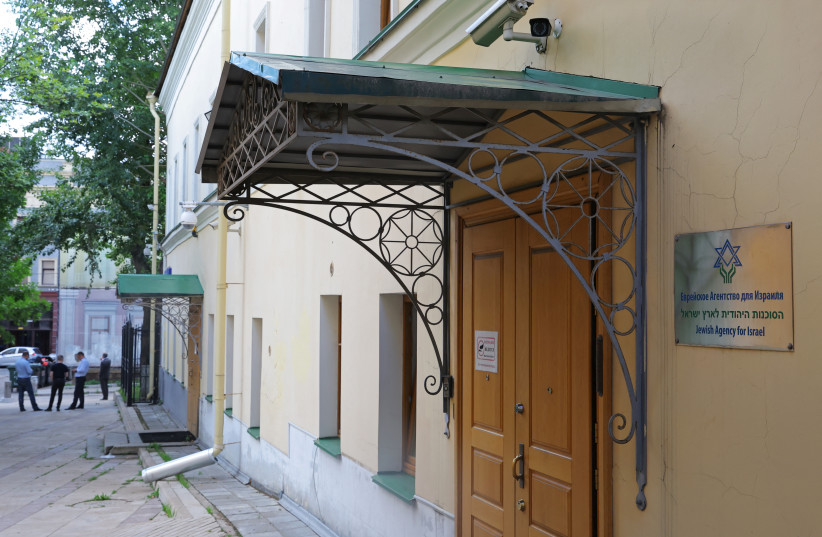Before long, the world will witness the resurfacing of the naive idealists who launched the Soviet Jewry protest movement two generations ago. This time, round two of the never-ending “Let my People Go” campaign will be in response to the Russian government’s decision to shut down operations of the Jewish Agency for Israel, thereby ending Russian emigration to that nation.
How many of the 600,000 Russian cohort tracing at least one Jewish grandparent, thereby falling under Law of Return eligibility, actually want to go to Israel, is unknown. But according to available figures, 30,000 Russians have already filed Aliyah applications, an additional 16,000 (three times greater than last year’s number) have this year emigrated to Israel, and 34,000 have taken up residence as tourists in the Holy Land.
What have we learned from the success of the battle with the Kremlin over Jewish emigration a half century ago that can be applied to the current confrontation? Terming the results of this earlier emigration as politically miraculous ranks as an understatement.
Allowing one million plus Jews to emigrate to Israel marked the first time in the Soviet Union’s history that an ethnic minority was given permission to emigrate, thus embarrassingly undermining the claim of the heirs of Lenin and Stalin that their Workers’ Paradise served as a beacon of glory for downtrodden humanity. Arguably, this morale downer represented by the Jewish departure, contributed to the eventual 1989 dissolution of the Soviet Union.
Moreover, the arrival of these Soviet émigrés to Israel, collectively enhanced the nation’s brainpower, laying the basis for what eventually came to be termed the Start-Up Nation. Spiritually, by championing the cause of Soviet Jewish emigration, world Jewry and other people of conscience made up in some small moral way for their silence and laziness during the Holocaust.

Tactically, the experience of 20th century Jewish emigration from the Soviet Union showed that this new Jewish Agency emigration diktat will not be assuaged by phone calls between Putin and whomever occupies Israel’s Prime Minister’s Office. It is mistaken to assume that because these Israeli political leaders met Putin a few times, an Ol’ Boys network exists prompting this KGB alumnus to rescind his anti-Jewish edict.
Is this because of Ukraine?
While we do not know for sure why Putin singled out his Jews for special opprobrium, most likely as a payback for Israel’s mild support for Ukraine, his move was well planned, not impetuous. Resorting to shtadlanus (behind the scenes intervention, court Jews) will not work here, just as it failed in the Soviet Jewry protest movement a half century ago.
In fact, what won the release of those Soviet Jews a half-century ago were public protests, the opposite of shtadlanus. These protests manifested themselves in various forms – rallies, demonstrations, picketing, street confrontations with Soviet diplomats and exhibitors. American politicians, such as the Jackson-Vanik Amendment affecting trade, took their cues from these protesters. West European Communist Party officials visiting Moscow raised the plight of Soviet Jews because of pressures from humanitarian sorts back home. Interfaith efforts also spurred awareness.
In the end, we must try to use this public moral suasion to convince Putin to drop the ban on Jewish emigration. We must cite the provision of the UN Declaration of Human Rights allowing people to emigrate from their birthplace. Admittedly, restoring the Jewish Agency in Russia will be hard to accomplish given the absence of any world order and the positioning of Putin’s Russia in the toilet bowl of Western diplomacy.
But Putin still wants some respectability. He continues calling his attack on Ukraine an “operation” rather than a war. Things could get worse for him in Africa, with no nation there thus far having imposed sanctions on Russia. Public attention to the Jewish emigration ban might give China the moral high ground in its rivalry with Russia for leadership of the world’s despotisms. Within the Kremlin hierarchy, Putin no doubt faces at least some rivalry and his curb on Jewish emigration might strengthen the forces against him.
Finally, for these Jewish aliyah applicants, images of international public protests supporting the right of beleaguered Russian Jews to build a life in Zion, would bring hope, just as it did to the Refuseniks, their ideological ancestors of yore.
The writer is an emeritus professor of political science at City University of New York and author of The Unredeemed: Anti-Semitism in the Soviet Union.
